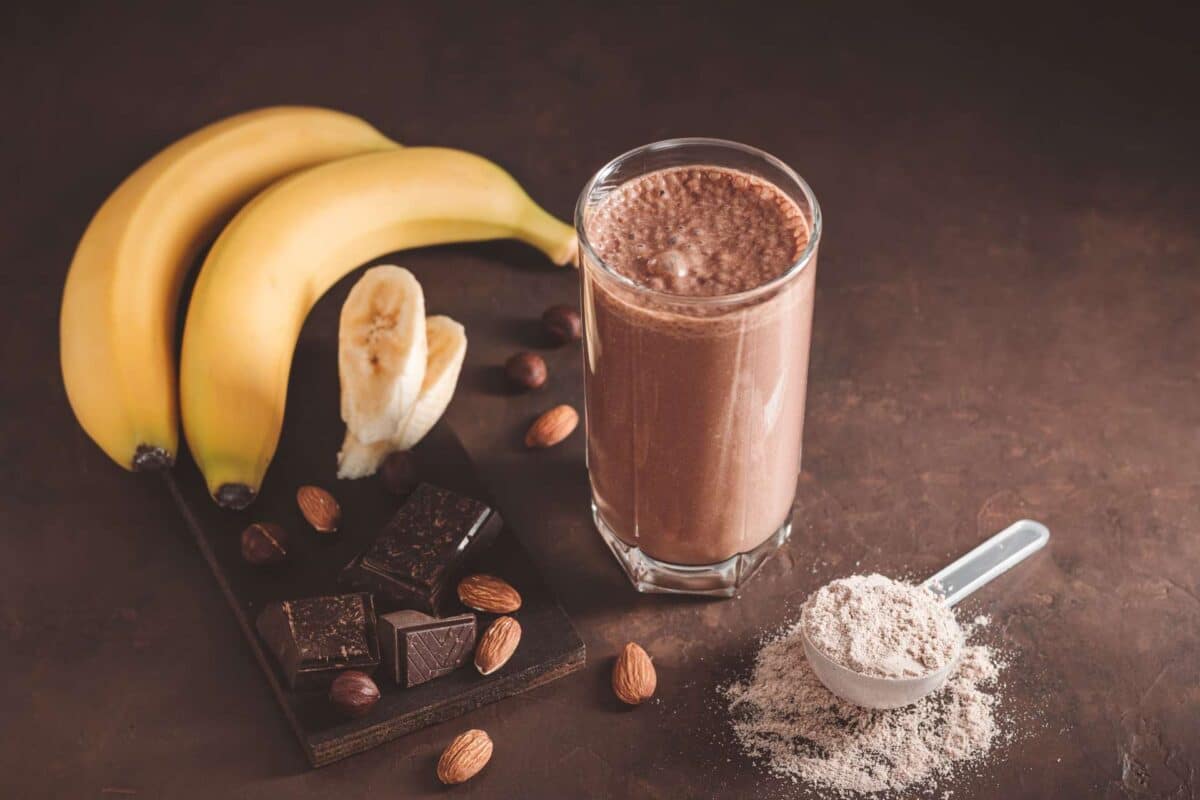Plant-Based Foods Association’s 2023 Plant-Based Foods State of the Marketplace Report highlights that 41% of consumers choose plant-based menu items when dining out weekly











Here’s Why Almond Protein Powder is Exploding in Health Industries


Almond protein powder is becoming a star in the health and wellness sector. It has numerous applications, making it a versatile ingredient in the food and beverage industry.
Almond protein powder is becoming a star in the health and wellness sector. It has numerous applications, making it a versatile ingredient in the food and beverage industry. From protein bars and smoothies to baked goods, almond protein powder is finding its way into a variety of products. The growing interest in plant-based diets is creating a significant demand for plant-based protein sources. Let’s delve deeper into why almond protein powder is gaining traction and its potential impact on the industry.
Consumer Preferences Shifting: The Rise of Plant-Based and Clean Label
Consumers are increasingly opting for plant-based protein alternatives due to a variety of factors, including:
- Health Concerns: A growing body of research suggests that plant-based diets can offer numerous health benefits, including reducing the risk of heart disease, cancers, and type 2 diabetes.
- Sustainability: Consumers are becoming more environmentally conscious. Plant-based protein sources often have a lower environmental footprint.
- Ethical Concerns: Some consumers choose plant-based proteins due to ethical concerns surrounding animal welfare.
- Dietary Restrictions: Almond protein powder is vegan, gluten-free, and dairy-free, making it a suitable option for people with various dietary restrictions.
According to a report by Allied Market Research, the vegan food market was valued at $19.7 billion in 2020 and is expected to reach $36.3 billion by 2030.
Plant-Based Foods Association’s 2023 Plant-Based Foods State of the Marketplace Report highlights that 41% of consumers choose plant-based menu items when dining out weekly, and a staggering 88% have maintained or increased their consumption of plant-based foods in the past three months. The report also found that e-commerce sales of plant-based foods are booming, with a 16.4% annual growth rate over the past three years.
These trends indicate a clear shift in consumer preferences towards plant-based options, positioning almond protein powder for continued success.
Is Almond Protein Powder Healthy? Unpacking Its Nutritional Profile
Almond protein powder is a healthy and versatile ingredient that can fit into a variety of dietary needs. Here’s a closer look at its nutritional profile:
- Protein Content: Almond protein powder is a concentrated source of plant-based protein. Harris Woolf Almond’s almond protein powder typically contains around 40% more protein than traditional almond flour. This makes it an ideal option for athletes, fitness enthusiasts, and anyone looking to increase their protein intake.
- Vitamins and Minerals: Almond protein powder is a good source of several vitamins and minerals, including vitamin E, potassium, and iron.
- Fiber: Almond protein powder is a good source of fiber, which can aid digestion and promote gut health.
- Low in Saturated Fat and Carbs: Almond protein powder is naturally low in saturated fat and carbohydrates.
These qualities make almond protein powder a well-rounded nutritional supplement that can complement a healthy diet.
Comparing Almond Protein Powder to Other Plant-Based Proteins
When comparing almond protein powder to other plant-based protein sources such as soy, pea, and rice, several factors come into play, including taste, texture, allergen-friendliness, and nutritional profile.
Taste and Texture
Almond protein powder has a naturally pleasant, slightly nutty flavor that enhances the taste of many products without overpowering them. It has a fine texture that blends well into various formulations, providing a smooth consistency. In contrast, soy protein can have a more pronounced bean-like taste, which may not be appealing in all applications, while pea protein often has a gritty texture and a somewhat earthy flavor. Rice protein is relatively neutral in taste but can be chalky in texture.
For formulators looking to balance taste, texture, and cost, almond protein powder can be combined with other proteins like soy or pea. This not only helps to mask less desirable flavors from other proteins but also creates a more complete protein profile, which is beneficial for consumers looking for well-rounded nutrition. While almond protein tends to be more expensive, blending it with other proteins offers formulators a cost-effective way to retain the health benefits and consumer appeal of almonds.
Allergen-Friendliness
Allergen concerns are significant in the food industry. Almond protein powder is a good option for those avoiding soy due to allergies or sensitivities. While almond allergies exist, they are less common compared to soy allergies. Pea protein is generally hypoallergenic but may not be suitable for people with legume allergies. Rice protein is also considered hypoallergenic, making it a safe alternative for those with multiple food sensitivities.
Nutritional Profile
Almond protein powder shines with its balanced nutritional content. Here’s a side-by-side look at the nutrient profiles of different brands.
| Nutrient | Almond Protein Powder (per 100g) | Soy Protein (per 100g) | Pea Protein (per 100g) | Brown Rice Protein (per 100g) |
| Energy (kcal) | 409 | 368 | 455 | 370 |
| Protein (g) | 45.45 | 84.2 | 86.4 | 75.0 |
| Total Fat (g) | 11.36 | 5.26 | 9.09 | 0.0 |
| Carbohydrates (g) | 31.82 | 5.26 | 4.55 | 16.0 |
| Dietary Fiber (g) | 13.6 | 0.0 | 0.0 | 8.0 |
| Total Sugars (g) | 9.09 | 0.0 | 0.0 | 0.0 |
| Added Sugars (g) | 0 | 0 | 0 | 0 |
| Calcium (mg) | 559 | 42 | 136 | 240 |
| Iron (mg) | 6.82 | 10.5 | 22.7 | 25.9 |
| Potassium (mg) | 1366 | 42 | 91 | 5 |
| Sodium (mg) | 57 | 1000 | 1180 | 5 |
| Vitamin D (IU) | 0 | 0 | 0 | 0 |
| Saturated Fat (g) | 0 | 0 | 0 | 0 |
| Trans Fat (g) | 0 | 0 | 0 | 0 |
| Cholesterol (mg) | 0 | 0 | 0 | 0 |
Applications of Almond Protein Powder in the Food and Beverage Industry
The versatility of almond protein powder makes it a valuable ingredient for a variety of food and beverage applications. Here are some examples:
- Protein Bars: Almond protein powder is a popular ingredient in protein bars, providing a satisfying and nutritious on-the-go snack.
- Smoothies and Shakes: Almond protein powder can be easily blended into smoothies and shakes to boost their protein content.
- Baked Goods and Beyond: Almond protein powder can be added to baked goods such as muffins, cookies, and pancakes to increase their protein content and provide a nuttier flavor. Can even seamlessly blend into pizzas, pasta, tortillas, and other store-bought products.
- Fortified Foods: Almond protein powder can be used to fortify yogurts, cereals, and other foods with protein
Discover Premium Almond Protein Powder with Harris Woolf Almonds
Harris Woolf Almonds is your partner in crafting exceptional almond-based products. Our almond protein powder stands out with its superior nutritional profile, achieved through a pressing process that delivers a higher protein content than traditional almond flour. Whether you prefer blanched or unblanched, our customizable approach ensures your product meets exact specifications.
From protein-packed blends to innovative baked goods and low-carb options, our versatile almond protein powder is the ideal ingredient to elevate your product. Let’s collaborate to create something extraordinary.
For those in Los Angeles searching for healthy food options, almond protein powder can serve as a versatile and nutritious addition to your diet. Learn more about exploring healthy eating options in LA in this guide by Gourmaze, which highlights the city’s best spots for health-conscious choices.
Reach out today to explore our product and discuss custom options!
